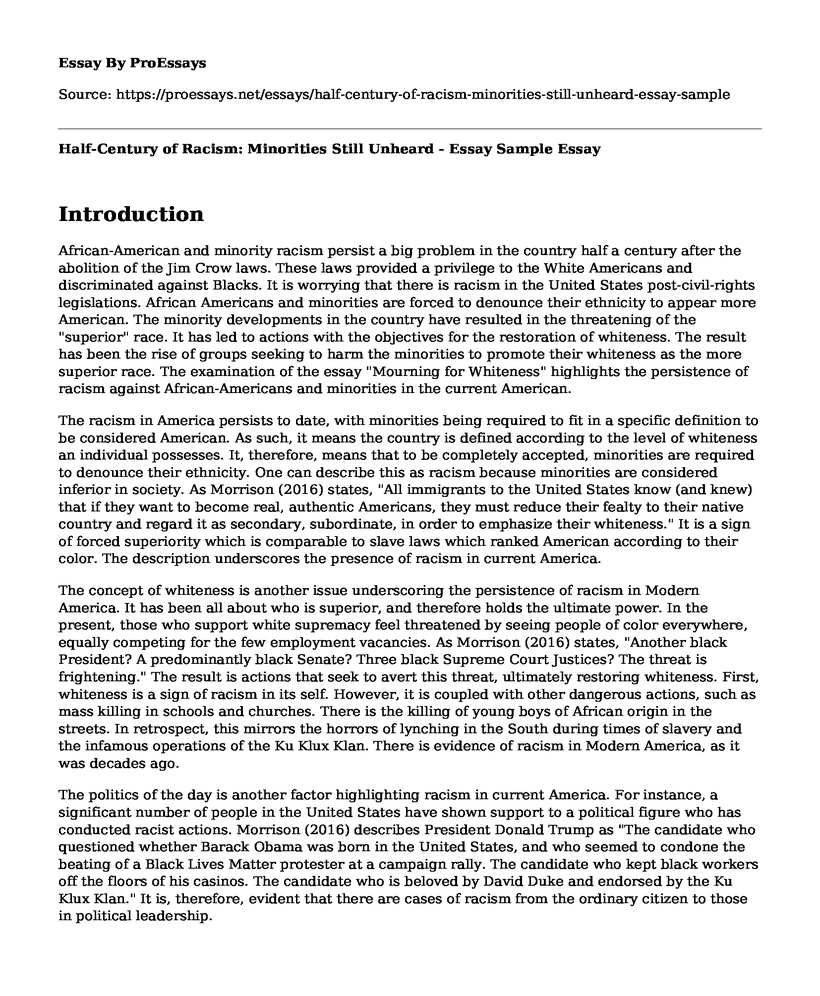Introduction
African-American and minority racism persist a big problem in the country half a century after the abolition of the Jim Crow laws. These laws provided a privilege to the White Americans and discriminated against Blacks. It is worrying that there is racism in the United States post-civil-rights legislations. African Americans and minorities are forced to denounce their ethnicity to appear more American. The minority developments in the country have resulted in the threatening of the "superior" race. It has led to actions with the objectives for the restoration of whiteness. The result has been the rise of groups seeking to harm the minorities to promote their whiteness as the more superior race. The examination of the essay "Mourning for Whiteness" highlights the persistence of racism against African-Americans and minorities in the current American.
The racism in America persists to date, with minorities being required to fit in a specific definition to be considered American. As such, it means the country is defined according to the level of whiteness an individual possesses. It, therefore, means that to be completely accepted, minorities are required to denounce their ethnicity. One can describe this as racism because minorities are considered inferior in society. As Morrison (2016) states, "All immigrants to the United States know (and knew) that if they want to become real, authentic Americans, they must reduce their fealty to their native country and regard it as secondary, subordinate, in order to emphasize their whiteness." It is a sign of forced superiority which is comparable to slave laws which ranked American according to their color. The description underscores the presence of racism in current America.
The concept of whiteness is another issue underscoring the persistence of racism in Modern America. It has been all about who is superior, and therefore holds the ultimate power. In the present, those who support white supremacy feel threatened by seeing people of color everywhere, equally competing for the few employment vacancies. As Morrison (2016) states, "Another black President? A predominantly black Senate? Three black Supreme Court Justices? The threat is frightening." The result is actions that seek to avert this threat, ultimately restoring whiteness. First, whiteness is a sign of racism in its self. However, it is coupled with other dangerous actions, such as mass killing in schools and churches. There is the killing of young boys of African origin in the streets. In retrospect, this mirrors the horrors of lynching in the South during times of slavery and the infamous operations of the Ku Klux Klan. There is evidence of racism in Modern America, as it was decades ago.
The politics of the day is another factor highlighting racism in current America. For instance, a significant number of people in the United States have shown support to a political figure who has conducted racist actions. Morrison (2016) describes President Donald Trump as "The candidate who questioned whether Barack Obama was born in the United States, and who seemed to condone the beating of a Black Lives Matter protester at a campaign rally. The candidate who kept black workers off the floors of his casinos. The candidate who is beloved by David Duke and endorsed by the Ku Klux Klan." It is, therefore, evident that there are cases of racism from the ordinary citizen to those in political leadership.
Conclusion
In conclusion, racism began decades ago during the time of the slave trade. There have been many deaths of people trying to end these oppressions in society. Some of the successes have been the end of segregation laws and the civil rights movement. However, in Modern America, people are still discriminated against due to the color of their skin. Society needs to learn from past mistakes and learn with are all equal, thereby promote equality.
Works Cited
Morrison, Toni. "Making America White Again." The New Yorker, The New Yorker, 14 Nov. 2016, www.newyorker.com/magazine/2016/11/21/making-america-white-again.
Cite this page
Half-Century of Racism: Minorities Still Unheard - Essay Sample. (2023, Jun 07). Retrieved from https://proessays.net/essays/half-century-of-racism-minorities-still-unheard-essay-sample
If you are the original author of this essay and no longer wish to have it published on the ProEssays website, please click below to request its removal:
- The Ban on 3D Gun Blueprints Essay
- Essay Sample on Over the Counter Medications, Herbal, and Nutrition
- Essay Sample on Violence and Terror on the Southwest Border
- Rhetorical Triangle Analysis of Virginia Woolf's Speech "Professions for Women"
- Life Experiences: Our Biology, Our Choices - Essay Sample
- Essay Sample on Seneca Falls Convection of 1848: Pillar of Women's Rights in the US
- Essay Sample on Workplace Bullying: A Growing Epidemic in the US







